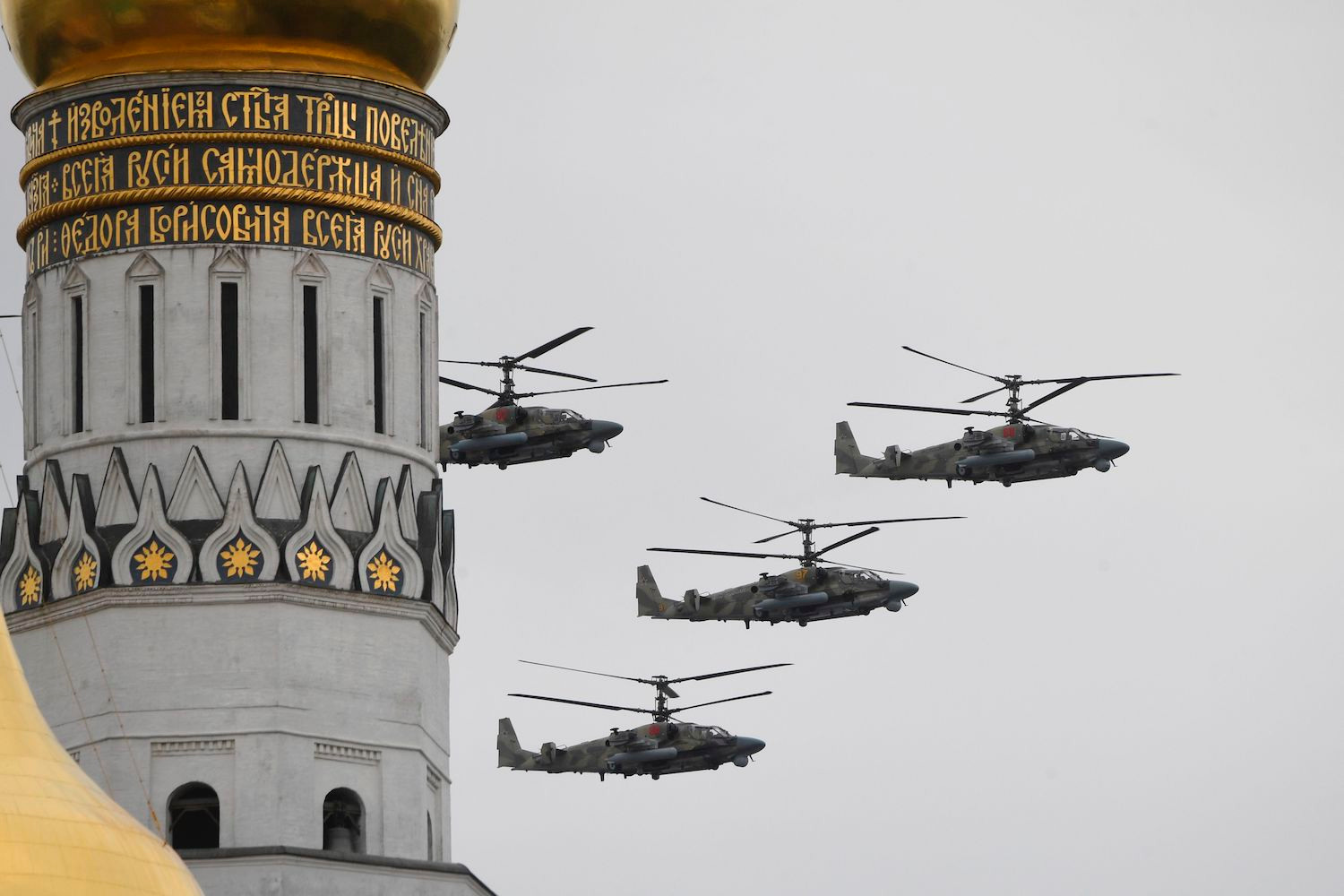
A Russian Air Force Tu-214 flies over Offutt Air Force Base on April 26, 2019. /AP
A Russian Air Force Tu-214 flies over Offutt Air Force Base on April 26, 2019. /AP
After U.S. President Donald Trump announced the U.S.' potential withdrawal from the Treaty on Open Skies (TOS) over a month ago, the 34 signatories will hold talks on Monday to discuss the future of the international agreement.
Citing noncompliance from Russia, U.S. Secretary of State Mike Pompeo said the withdrawal would take effect six months after May 22 unless Russia returns to full compliance with the treaty. Can the other parties find a way to save it in less than five months?
The last surviving confidence-building mechanism between the U.S. and Russia
Signed March 24, 1992, the Open Skies Treaty, proposed by U.S. President Dwight Eisenhower in 1955, permits each party to conduct short-notice, unarmed reconnaissance flights over the others' entire territories to collect data on military forces and activities.
Currently, 35 nations including Russia, the United States and some other members of the North Atlantic Treaty Organization (NATO) have signed the treaty. Kyrgyzstan has signed but not ratified it yet.
The United States first informed the parties about Russian noncompliance in June 2017. These concerns were repeated in the State Department's annual Compliance Report in August 2019 and in October 2019, and later reports emerged that the Trump administration was considering withdrawing from the treaty.
The treaty now represents one of the very few remaining opportunities for military-to-military contact between Washington and Moscow – the Trump administration withdrew from the Joint Comprehensive Plan of Action (JCPOA) and the Intermediate-Range Nuclear Forces Treaty (INF), and the New Strategic Arms Reduction Treaty (START) is poised to expire on February 5 next year.
Unlike INF or START, Open Skies has never been a major pillar of arms control, but it has provided a measure of transparency and predictability in a field that is again going through a period of division and estrangement.
Article XV of the treaty sets out the terms under which parties may exercise "the right to withdraw." First, a party must notify the other parties of its intent to withdraw at least six months in advance. Once this occurs, the state parties, including the withdrawing party, are supposed to convene a conference within 30 to 60 days to discuss the effects of the withdrawal.
In this regard, chances for the treaty not becoming history remain as the six-month buffer leaves space for more possibilities.

Russian Kamov Ka-52 "Alligator" attack helicopters fly over the Kremlin and Red Square to mark the 75th anniversary of the victory over Nazi Germany in World War II, Moscow, Russia, May 9, 2020. /AFP
Russian Kamov Ka-52 "Alligator" attack helicopters fly over the Kremlin and Red Square to mark the 75th anniversary of the victory over Nazi Germany in World War II, Moscow, Russia, May 9, 2020. /AFP
Chance 1: Domestic pressure
Experts say that the Trump administration may still feel pressure to comply with congressional requirements and underscore the substantial legal and political authority that Congress can exercise over treaty withdrawal when it chooses, even where the specific measures it adopts may not be legally effective.
Senior U.S. Senate Democrats on June 22 accused the Trump administration of violating the law when it declared its intention in May.
The letter from Senate Democratic Leader Chuck Schumer and senators Mark Warner and Jack Reed, the top Democrats on the Intelligence and Armed Services committees, called on the administration to immediately discontinue efforts to withdraw.
It also suggested that Trump's decision may have been politically motivated because it took place less than five months before he is up for reelection in November.
Democratic presidential candidate Joe Biden criticized the withdrawal as "short-sighted policy," saying that the move will exacerbate growing tensions between the West and Russia, and increase the risks of miscalculation and conflict.
"These Russian violations should be addressed not by withdrawing from the Treaty, but by seeking to resolve them through the Treaty's implementation and dispute mechanism," Biden said in a statement.
The U.S. House of Representatives Armed Services Committee also expressed concern about the withdrawal, according to the committee's proposals for the U.S. defense budget for the next fiscal year, which demanded from the administration "a report on the impact on the national security of a potential exit, on the position of the allies on the U.S. exit and how the U.S. could make up for the photos and information received under the treaty."
Chance 2 : Global efforts
After the withdrawal announcement, related global parties have held meetings and released statements to try to save the dying treaty. Over 30 countries have pledged to keep adhering to the treaty, including Russia, America's NATO allies and Eastern European states.
NATO allies met and vowed to continue to uphold, support, and further strengthen arms control, disarmament, and non-proliferation, as well as urged Russia to take actions to save the treaty.
"NATO Allies and partner nations have engaged with Russia, both in capitals and at the OSCE in Vienna, to seek Russia's return to compliance at the earliest date possible. Russia's return to compliance is the best way to preserve the benefits of the Treaty," according to the statement by the NATO secretary general on the treaty.
Ten European Union countries expressed regret at the withdrawal, announcing that dialogue will continue with Russia and the they will continue to implement the treaty.
In a joint statement, the foreign ministries of Belgium, the Czech Republic, Finland, France, Germany, Italy, Luxembourg, the Netherlands, Spain and Sweden said the pact "is a crucial element of the confidence-building framework that was created over the past decades in order to improve transparency and security across the Euro-Atlantic area."
China, which is not a party to the treaty, expressed "deep regret" over the U.S. move, calling it a "display of the United States' entrenched Cold War mentality."
"As noted, we may be willing to reconsider this decision if Russia demonstrates a return to full compliance with this confidence-building Treaty, but without such a change of course from the Kremlin, our path will lead to withdrawal in six months' time," Pompeo said.
However, Russia has repeatedly refuted U.S. accusations on breaching the treaty. The Russian Foreign Ministry said that Moscow would work with the United States only on a mutual basis and would not accept any ultimatums.
Russian Deputy Foreign Minister Sergei Ryabkov warned on Saturday that the problem is "the United States systematically quits international arms control agreements and destroys the entire architecture in this area."
"We do not rule out any options for ourselves," he said. "We will make it abundantly clear to our colleagues on Monday (at the online conference) so that they have no illusions."
"If our counterparts are interested in preserving the treaty, they should make every effort to ensure its viability, in particular, work with the United States on the inadmissibility of further destructive steps by Washington," Ryabkov stressed.
Chance 3: More surprises?
Once asked after the announcement if he could explain why the government would exit the treaty, Trump's characteristically incoherent response was, "Russia didn't adhere to the treaty, and anyway, when we pull out, Russia will want to make a new deal with us," without explaining how or even why it's necessary.
Though the president's remarks gave no clear clues of his further plan, the clear point is that the chances of collapse or not are very hard to estimate.
"Any forecast is based on some predictable trends, whereas the politics of the Trump administration are unpredictable," said Aleksey Arbatov, head of the Center for International Security of the Institute of World Economy and International Relations.
The U.S.' withdrawal without trying to make any compromises is another example of the Trump administration's political sentiment and ideology, said the expert.